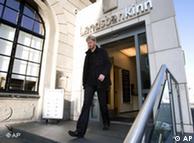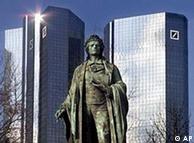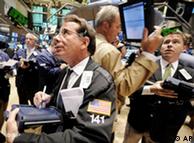FINANCE | 13.09.2010
New global banking rules aim at greater protection
New banking rules brokered by the Basel Committee on Banking Supervision - dubbed Basel III - will force banks to increase their capital reserves significantly. The agreement is intended to curb the risky activities that thrived and ultimately upended Wall Street - and shook the global economy to the core.
The world's major central banks argue the new rules will ensure the interconnected global banking system avoids a crisis like the most recent one that led to taxpayer bailouts around the world.
Simple logic
The logic of Basel III is fairly simple: If banks are forced to hold more capital in reserve, they will restrict the amount of loans they make and thus be in a better position if many of those loans go sour. Also, with large stockpiles of capital on hand, they are able to continue lending - albeit at a lower level - should the economy worsen.
 Tiny Iceland's big banking problems added to the global financial turmoilRegulators and analysts argue that banks with more capital have a lower risk of failure or insolvency.
Tiny Iceland's big banking problems added to the global financial turmoilRegulators and analysts argue that banks with more capital have a lower risk of failure or insolvency.
"The agreement is definitely a move in the right direction, although it could pose challenges for some banks like smaller German savings banks that lack the direct ability to raise capital on money markets," said Manfred Jaeger-Ambrozewicz of the Cologne Institute of Business Research.
Many banks in Europe have warned the new rules could drive up the cost of credit to borrowers and restrict lending, thus dampening the fragile economic recovery. European banks are less capitalized than their US counterparts and are more likely to be forced to raise additional funds under the new Basel rules. Germany's biggest lender, Deutsche Bank, has already responded to the rules by announcing plans to sell at least 9.8 billion euros ($12.4 billion) of stock. Other major European banks are expected to follow.
"All these claims of a possible economic slow-down because of the new banking rules are really exagerated," Falko Fecht, a professor of economic and banking policy at the Wiesbaden-based European Business School, told Deutsche Welle. "Sure, the timing of such a measure isn't ideal but it never is after a recession."
Intensive lobbying
Across Europe, banks had lobbied their governments and supervisory bodies intensively to soften the Basel rules, which had been under negotiation for more than a year. And many of them are far from happy with the outcome.
 Deutsche Bank is already taking steps to raise equity"European banks will meet the new requirements," Guido Ravoet, secretary general of the European Bank Federation, said in a press statement. "But it will have consequences on the volume and cost of lending and, therefore, a cost on our economy, too."
Deutsche Bank is already taking steps to raise equity"European banks will meet the new requirements," Guido Ravoet, secretary general of the European Bank Federation, said in a press statement. "But it will have consequences on the volume and cost of lending and, therefore, a cost on our economy, too."
Regulators argue the benefits of tougher rules, such as less risk of shouldering another costly banking crisis, far outweigh any diminished lending levels.
Currently, banks must hold back at least four percent of their balance sheet to cover risks. Under the new rules, this mandatory reserve of so-called Tier 1 capital will rise to 4.5 percent by 2013 and reach six percent by 2019. The Basel committee narrowed the definition of Tier 1 capital to emphasize the value of common equity, which is considered the most effective type of capital because it is used to directly absorb losses.
Covering risk
In addition, banks would be required to keep an emergency reserve, known as a "conservation buffer," of 2.5 percent. They will have to begin building the buffer by 2015 and must have it fully in place by January 1, 2019.
Tallied up, the amount of rock-solid reserves banks are expected to have by the end of the decade will be 8.5 percent of their balance sheets.
"The new laws could increase the cost of lending only slightly, but they will not endanger economic recovery even if it slows a bit," Jaeger-Ambrozewicz said. "The rules are necessary and could force some much need restructuring, especially of the state banks in Germany."
Author: John Blau
Editor: Kate Bowen

Comments